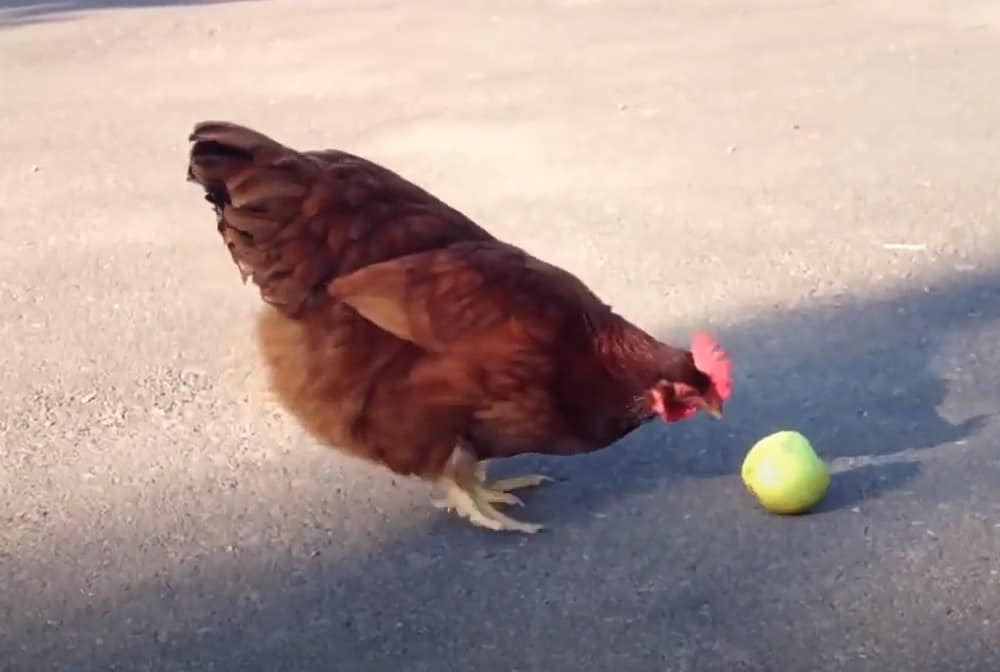Chickens are known to be omnivorous creatures, meaning that they enjoy a varied diet. While a chicken’s diet should primarily consist of chicken feed, there are plenty of other foods that can be thrown into the mix in order to provide your feathered friends with a little extra nutrition.
When it comes to feeding your chickens, you might be wondering if apples are on the menu. After all, they are healthy for humans, so why wouldn’t can chickens eat apples?
In fact, apples are a great source of vitamins and minerals for hens. They are also a good source of fiber. However, there are a few things to keep in mind.
What About Apple Peels For Chickens?
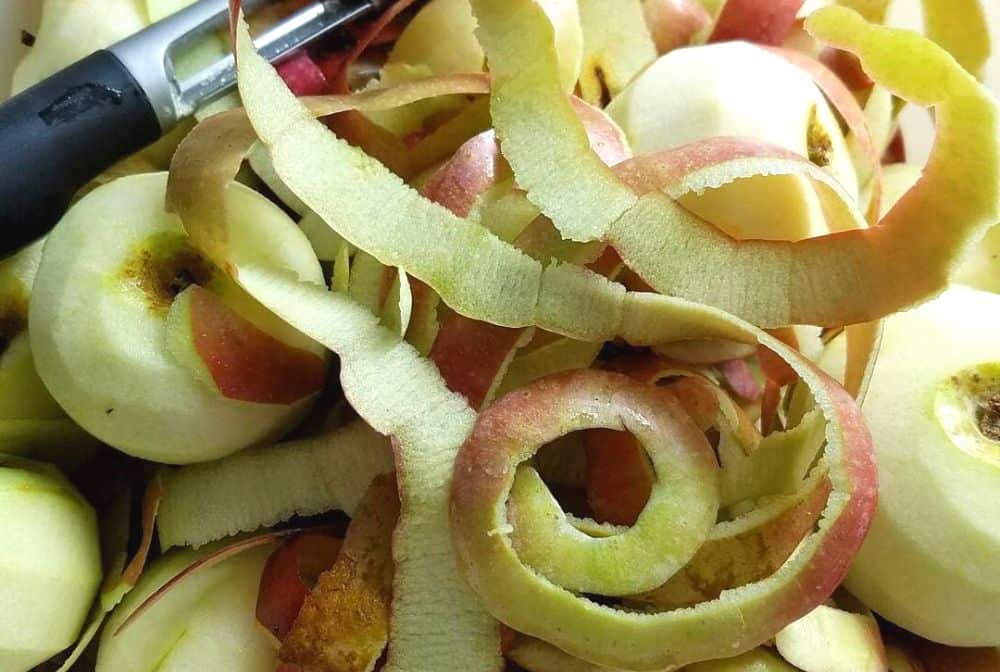
Chickens are able to eat apple peels without any issues. In fact, chicken owners report that their hens enjoy eating apple peels. In fact, chicken experts say that apple peels are actually good for chickens.
They’re a good source of fiber and can help with digestive problems. Apple peels contain a lot of nutrients that are beneficial for chickens, such as vitamins A and C. The fiber in apple peels can help hens with their digestion, and the vitamins can help boost their immune system. Apple peels also contain pectin, which can help chickens absorb more nutrients from their food.
Some people worry about the pesticide residue on apple peels, but it’s actually not a big concern. Chickens are not as sensitive to pesticides as humans are. Plus, the amount of residue on apple peels is very low. So there’s no need to worry about it.
While there are no negative side effects of feeding chickens apple peels, there are a few things to keep in mind:
First, apple peels should not make up the majority of a chicken’s diet. Chickens should still eat a balanced diet of chicken feed and other fruits and vegetables.
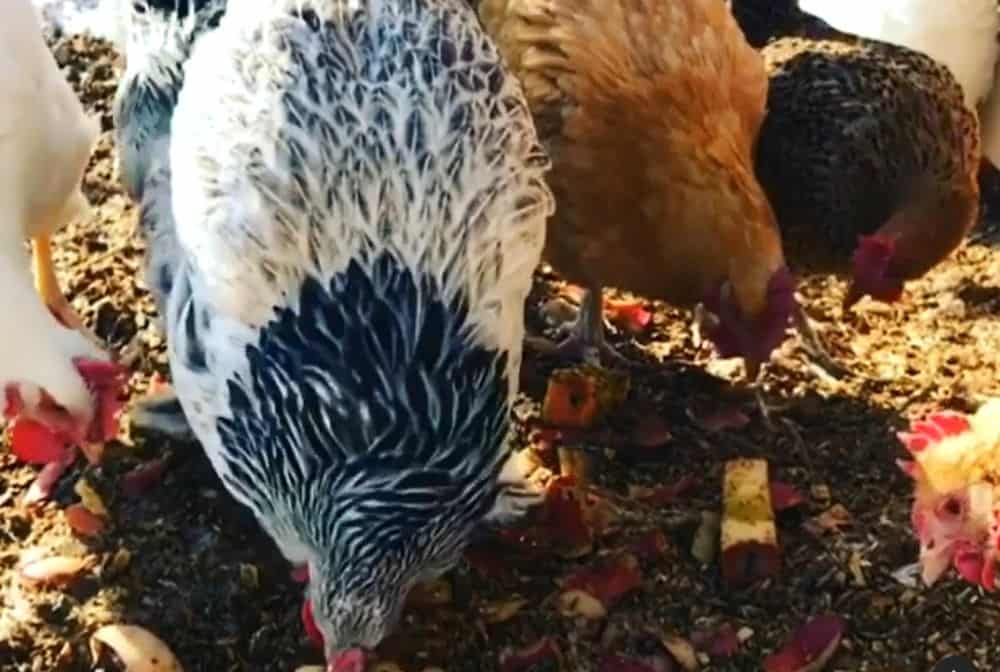
Secondly, apple peels should be fed to hens in moderation. Eating too many apple peels can lead to digestive issues in chickens.
Overall, feeding chickens apple peels is perfectly safe and can even be beneficial. Just be sure to feed them in moderation and alongside a balanced diet. So if you’re wondering if can chickens eat apple peels, don’t be afraid to give them the next time you have them.
Can Chickens Eat Apple Cores?
As the weather gets colder, apples become a staple in many households. But what about the apple cores?
On the one hand, apple cores contain a lot of fiber which is good for hens. Chickens need fiber to help them digest their food properly. In addition, apples are a good source of vitamins A and C, which can help boost a chicken’s immune system.
On the other hand, apple cores also contain a lot of sugar. Too much sugar can lead to obesity in chickens and other health problems. In addition, the seeds in apple cores contain cyanide, which is poisonous to hens.
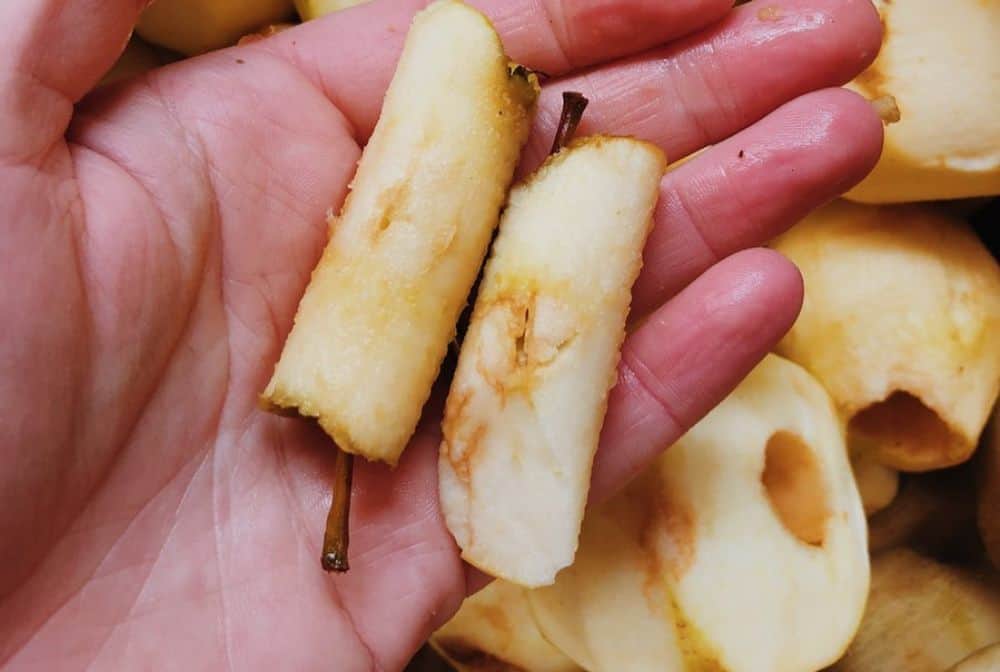
So, what’s the verdict? Can chickens eat apple cores? The answer is yes, but in moderation. Too much sugar is not good for them, but the fiber and vitamins in apples can be beneficial.
Can Chickens Eat Apple Seeds?
If you have chickens, you may have wondered if they can eat apple seeds. After all, hens love to eat fruit, and apples are a favorite treat. However, you may have heard that apple seeds contain cyanide and are poisonous. So, can chickens eat apple seeds?
The answer is yes and no. It depends on the number of apple seeds that are eaten. How many apple seeds are too many? It depends on the size of the chicken. A small chicken can eat a few apple seeds without any problems. A large chicken may need to eat more apple seeds to be poisoned.
There are two types of cyanide found in apple seeds. One type is called amygdalin. This type of cyanide is not very poisonous to hens. The other type is called prussic acid. This type of cyanide is more poisonous to chickens.
Prussic acid is released when the apple seeds are crushed. This is why it is important to not let your hens eat too many apple seeds. If they eat too many, they could be poisoned.
Can Chickens Eat Apple Flesh?
The short answer is yes, chickens can eat apple flesh. However, there are a few things to consider before giving your chicken apples. Apples are a good source of vitamins and minerals for hens, but they should not make up a large part of their diet. Too many apples can cause diarrhea in chickens.
The best way to give your chicken apples is to offer them as a treat. Chop up the apple into small pieces and offer it to your chicken a few at a time. Chickens will also enjoy eating apples that are left out to dry. You can add dried apples to your chicken’s regular feed.
About Cyanide And Cyanide Poisoning In Hens
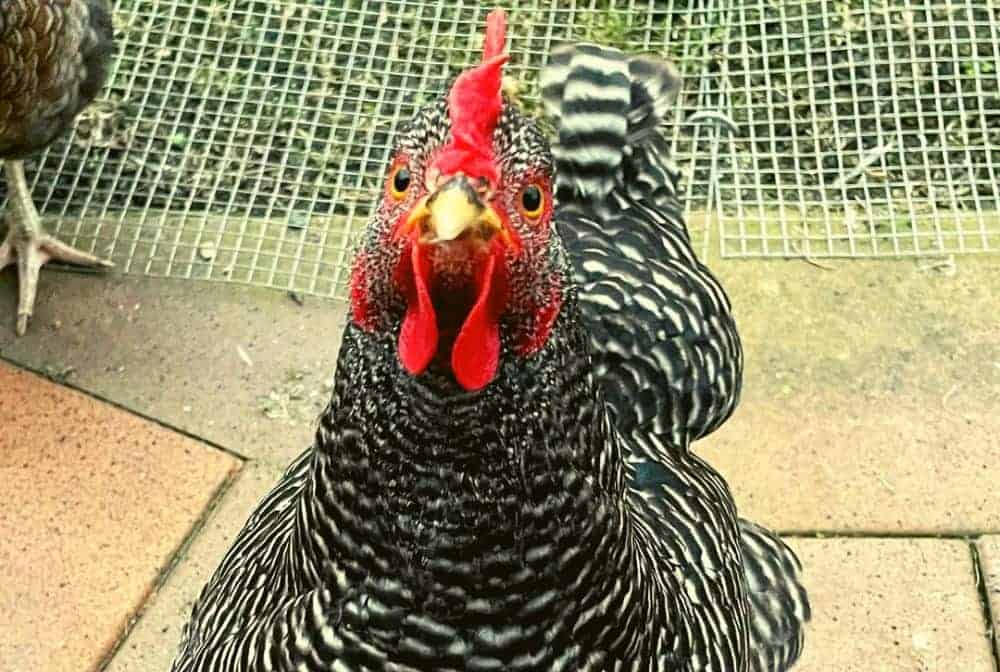
Cyanide poisoning in chickens is a serious problem. Hens are very sensitive to cyanide which can be fatal. Poisoning can occur through inhalation, ingestion, or absorption through the skin.
Cyanide poisoning is particularly dangerous to animals because they cannot metabolize cyanide as quickly as humans can. This is why cyanide is often used as a means of euthanizing animals. When animals are euthanized with cyanide, they typically experience a quick and painless death.
However, there have been some instances of cyanide poisoning in hens. Cyanide poisoning in hens typically occurs when the hens are housed in close quarters and are exposed to high levels of cyanide gas. This can happen when the hens are housed in buildings that are not well-ventilated. Cyanide gas can also build up in henhouses that are cleaned with cyanide-based cleaners.
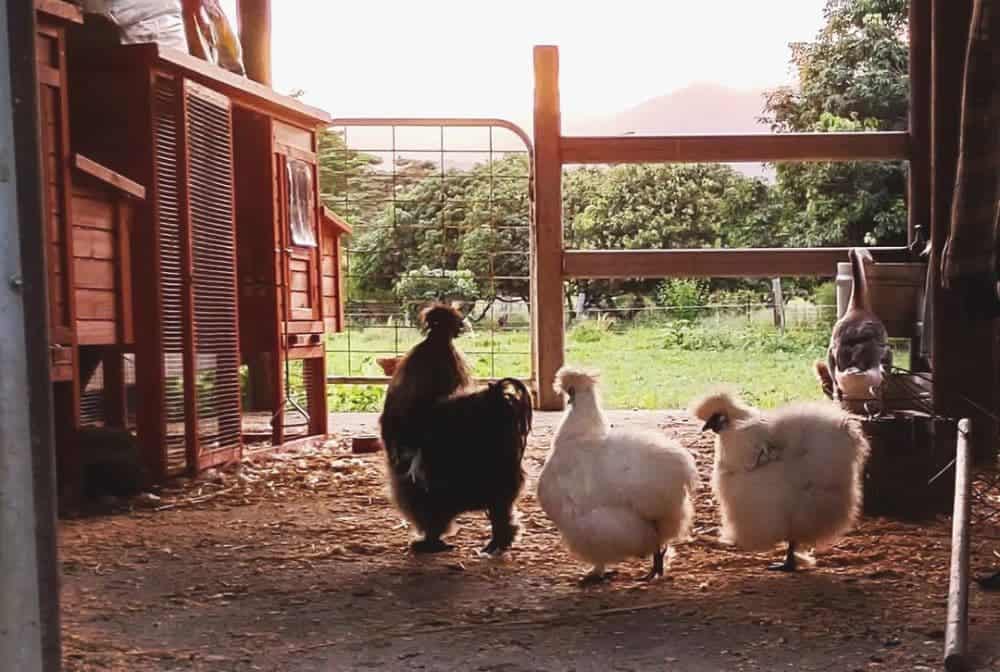
Is a poison that can be found in small amounts in the apple core and seeds. Cyanide poisoning in chickens is rare, but it can be fatal. To prevent cyanide poisoning, chickens should avoid eating large quantities of apple cores and seeds.
What Is Cyanide?
Cyanide is a fast-acting poison that interferes with the body’s ability to use oxygen. He prevents the cells from using oxygen to produce energy. As a result, the cells die. Cyanide is found in many substances, including cigarette smoke and the pits of some fruits. He is rapidly absorbed through the lungs and stomach and interferes with the body’s ability to use oxygen.
He is used in the process of electroplating, where it bonds metals to a surface. He is also used in some chemical manufacturing processes.
Treating Cyanide Poisoning In Chickens
There is no specific antidote for cyanide poisoning. Treatment focuses on supporting the respiratory and cardiovascular systems and treating the symptoms.
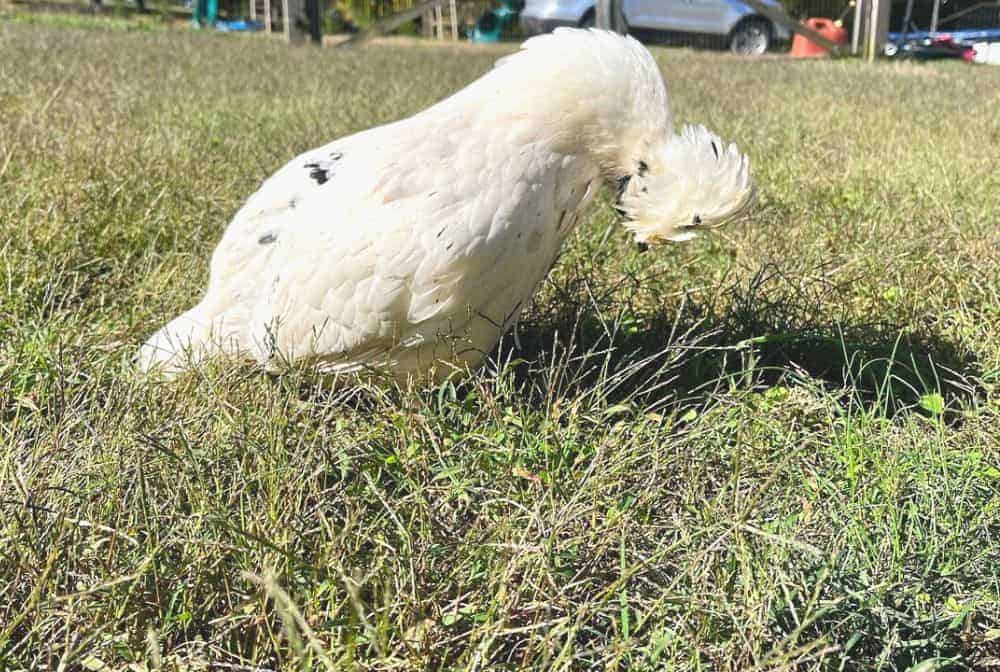
Oxygen therapy is often used to treat cyanide poisoning. This therapy helps to restore the body’s oxygen levels. In some cases, cyanide poisoning in hens can be prevented by providing the hens with fresh air and plenty of space. However, if the hens are already exposed to high levels of cyanide, they will need to be treated immediately.
Intravenous fluids are also often used to treat cyanide poisoning. These fluids help to keep the blood pressure up and to flush the cyanide out of the body.
Cyanide antidotes, such as hydroxocobalamin or sodium nitrite, may also be used to treat cyanide poisoning. These antidotes work by binding to the cyanide and making it less toxic.
Symptoms of cyanide poisoning in chickens include:
- Listlessness
- Lack of appetite
- Drowsiness
- Breathing difficulties
- Collapse
- Convulsions
- Death
If you think your chicken has been poisoned with cyanide, it is important to seek veterinary treatment immediately.
Tips and Preparing on Feeding Chickens Apple
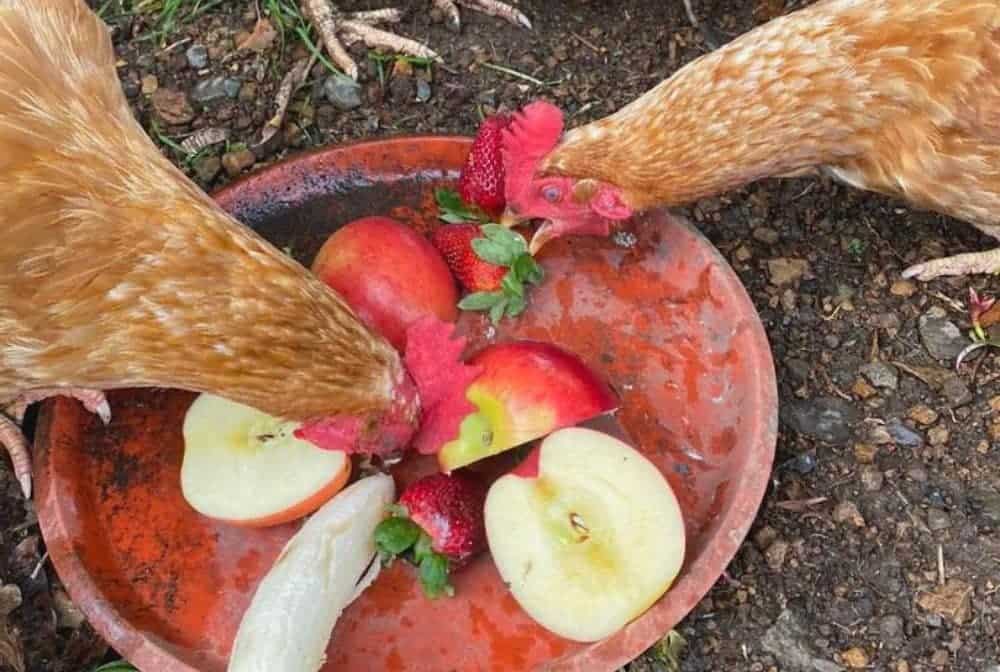
Apples are a healthy treat for chickens. When feeding apples, there are a few things to keep in mind.
Apples should be fed in moderation as part of a balanced diet. Chickens can eat the flesh of the apple as well as the seeds but in small quantities.
Apples can be fed to hens fresh, dried, or in other forms. Fresh apples should be washed to remove any pesticides or other chemicals. Dried apples can be bought at most pet stores. Applesauce and apple cider are also safe for chickens to eat.
When selecting apples for your chickens, choose those that are fresh and free of bruises or blemishes. Cut the apples into small pieces. You can feed apples to your chickens whole, but cutting them into smaller pieces will help prevent choking.
This popular fruit is not only a healthy treat for your hens, but it can also help keep them cool in the summer heat. Soak the apple pieces in cold water for a few minutes before feeding them to your flock. You can also add a few slices of apple to your chickens’ water bowl to help encourage them to drink more water, which is important for preventing dehydration.
Watch the Following Video on How To Give Chickens Apples
The Advantages of Feeding Your Chickens Apples
There are a few different ways that apples can benefit chickens. First, they are a good source of vitamins and minerals, including vitamins A and C, as well as potassium and fiber. Furthermore, apples can help chickens stay hydrated, as they are made up of 84% water.
One of the biggest advantages of feeding your hens apples is that it can help keep them healthy. Apples can help boost the immune system, and they also have anti-inflammatory properties. This means that apples can help reduce the risk of respiratory illnesses in chickens.
Finally, apples can help keep chickens entertained and occupied. Hens love to peck at things, and an apple provides them with a tasty treat that will keep them busy for a while. Plus, it’s a great way to use up any apples that are starting to go bad.
The Disadvantage of feeding Your Chickens Apples
One potential disadvantage is that apples contain sugar. While sugar isn’t necessarily bad for chickens, too much sugar can lead to weight gain and other health problems. In addition, apples contain a compound called malic acid, which can be harmful to chickens in large quantities.
Another potential disadvantage of feeding your chickens apples is that the seeds contain cyanide. Cyanide is poisonous to hens (and people), so it is important to control the amount of seed before giving apples to chickens.
Finally, apples can be a choking hazard for chickens. Сut the apples into small pieces to help prevent choking.
Overall, there are some potential disadvantages to feeding your hens apples. However, if you take precautions such as removing the seeds and cutting the apples into small pieces, you can still safely feed your chickens apples as part of a healthy diet.
What Happens if You Overfeed Your Chickens With Too Much Apples?
If you overfeed your chickens with too many apples, they may start to experience some health problems. Here are a few things that can happen if you overdo it with the apples:
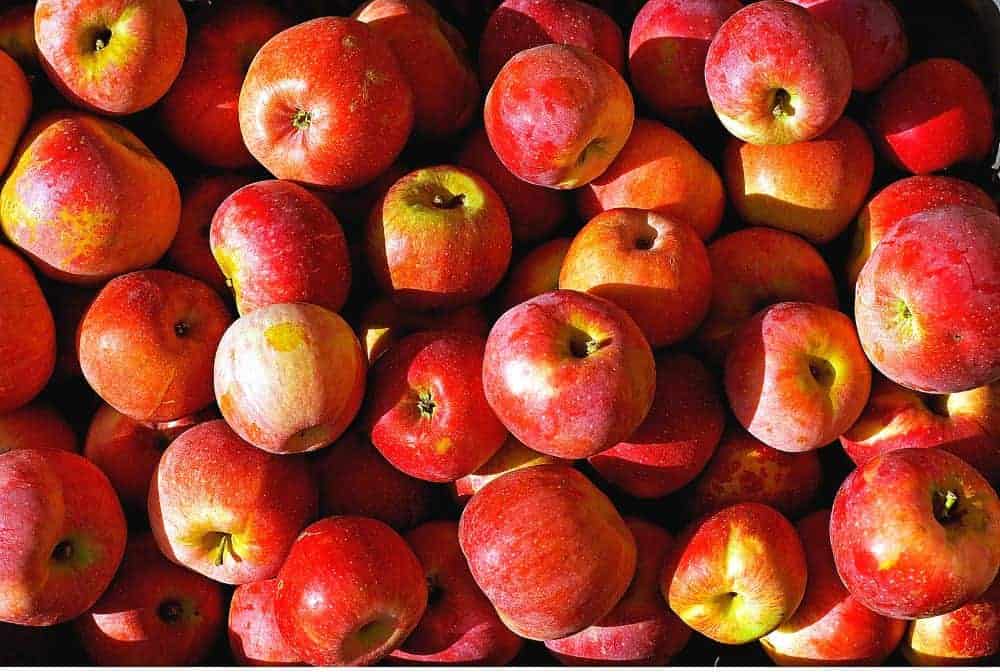
- Chickens can get diarrhea from eating too many apples.
- Chickens may also vomit or regurgitate their food if they eat too many apples.
- Overfeeding can lead to obesity in chickens, which can cause a number of health problems, including heart disease and joint problems.
- Chickens may also develop an intolerance to apples if they eat too many of them. This can lead to them not wanting to eat apples at all.
If you’re worried that you may have overfed your hens with apples, it’s best to contact a veterinarian to check them out. In most cases, the chickens will be fine, but it’s always better to be safe than sorry!
FAQs on Apple For Chickens
Can baby chicks eat apples?
Yes, baby chicks can eat apples. Apples are a good source of vitamins and minerals, and they can help chicks to stay healthy. However, it is important to make sure that the apples are chopped up into small pieces so that the chicks can easily eat them.
Are apple seeds poisonous to chickens?
The short answer is no, apple seeds are not poisonous to chickens. Apple seeds contain a small amount of cyanide, which is poisonous to chickens. However, a chicken would have to eat a large number of apple seeds to be affected.
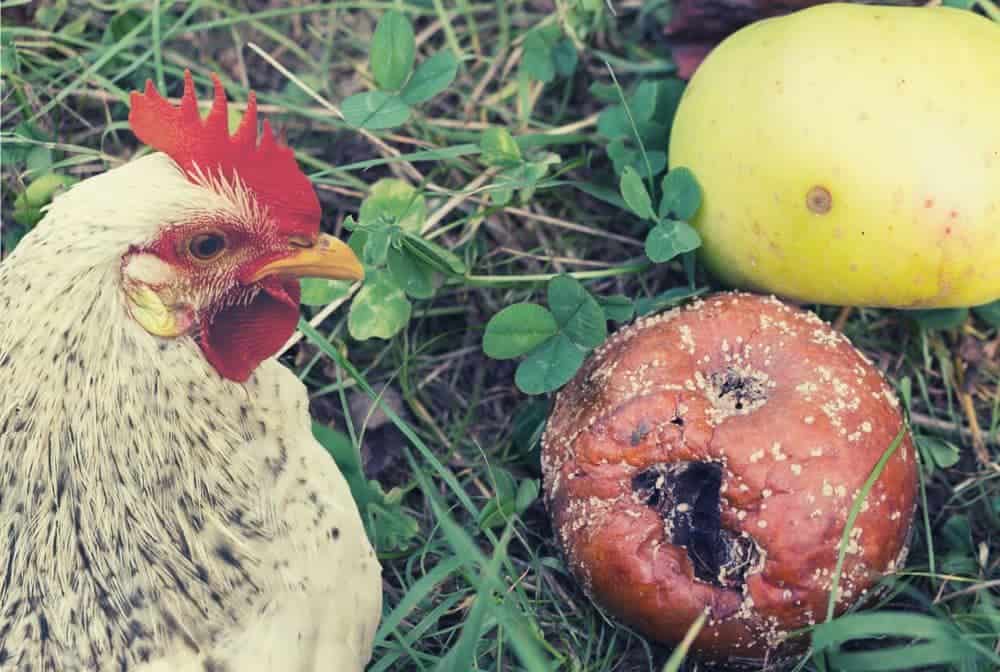
How often can I feed my chickens apples?
This question will depend on the specific chicken’s diet and what other fruits and vegetables they are also consuming. They are a good source of vitamins, but they are also high in sugar. Сan leads to health problems for hens, so it’s best to limit their intake. In general, however, it is safe to feed chickens apples up to two times per week.
Can chickens eat rotten apples?
If you have a rotten apple or two lying around, don’t worry, your hens can eat them. Should not eat too much rotten fruit because it can give them diarrhea. However, too much of a good thing can be bad, so make sure your chickens have plenty of other things to eat, too.
What fruits are toxic to chickens?
There are a variety of fruits that are toxic to chickens. Some of the most common ones include apple seeds, apricot pits, peach pits, and cherry pits. These fruits contain a chemical called cyanide, which can be harmful to hens. Other fruits that are toxic to chickens include avocados, figs, and grapes.
Closing Thoughts
Chickens can eat apples, including the skin and core. They contain nutrients that are good for hens, such as vitamin C, calcium, and fiber. A healthy treat, but be sure to offer them in moderation. Seeds contain cyanide, which is poisonous to chickens. Also, too many fruits can cause digestive problems. A balanced diet is important for hens and their diet should include a variety of different foods.
So, if you’re looking for a way to mix up your chicken’s diet and give them a little boost of nutrition, try feeding them apples. Your chickens will love them, and you’ll love the benefits that they provide.
Sources:
- Cyanide poisoning, North Dakota State University (authored by Charlie Stoltenow and Greg Lardy): https://www.ag.ndsu.edu/publications/livestock/cyanide-poisoning
- Malic acid, From Wikipedia https://en.wikipedia.org/wiki/Malic_acid
- Factors Affecting Intestinal Health in Poultry The National Center for Biotechnology Information (National Library of Medicine) https://www.ncbi.nlm.nih.gov/pmc/articles/PMC7107194/
